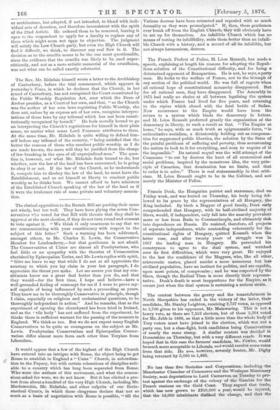The clerical opposition to the Burials Bill are pushing their
cause not wisely, but too well. They have been plying the seven Con- servatives The voted for that Bill with threats that they shall be opposcd at the next election, if they do not turn round and consent to vote against it. "We think it only courteous to say that we are communicating with your constituency with respect to the subject of this letter." Such a warning has been addressed, amongst others, to Mr. Charles E. Lewis, the Conservative Member for Londonderry,—but that gentleman is not afraid. The Conservatives of Ulster are almost all Presbyterians, who feel little or no sympathy with the theories of Consecration cherished by Episcopalian Tories, and Mr. Lewis replies with spirit, "Give me leave to say that while I do not at all appreciate the courtesy to which you lay claim in your last paragraph, I do appreciate the threat you make. Let me assure you that my con- stituents know me a great deal better than you do, and that they would—for the first time, I hope and believe—have a well-grounded feeling of contempt for me if I were to prove my- self capable of being influenced by such a proceeding as yours. They know me to be thoroughly Conservative in principle, though I claim, especially on religious and ecclesiastical questions, to be thoroughly independent in action." And he remarks, that as the experiment of opening the churchyard has been tried in Ireland, and as the 'vile body' has not suffered from the experiment, he thinks there is sufficient warrant for the passing of the measure in England. We think so too. But we do not expect many English Conservatives to be quite so courageous on the subject as Mr. Lewis. Presbyterian Conservatism and Episcopalian Conser- vatism differ almost more from each other than Toryism from Liberalism.


































 Previous page
Previous page